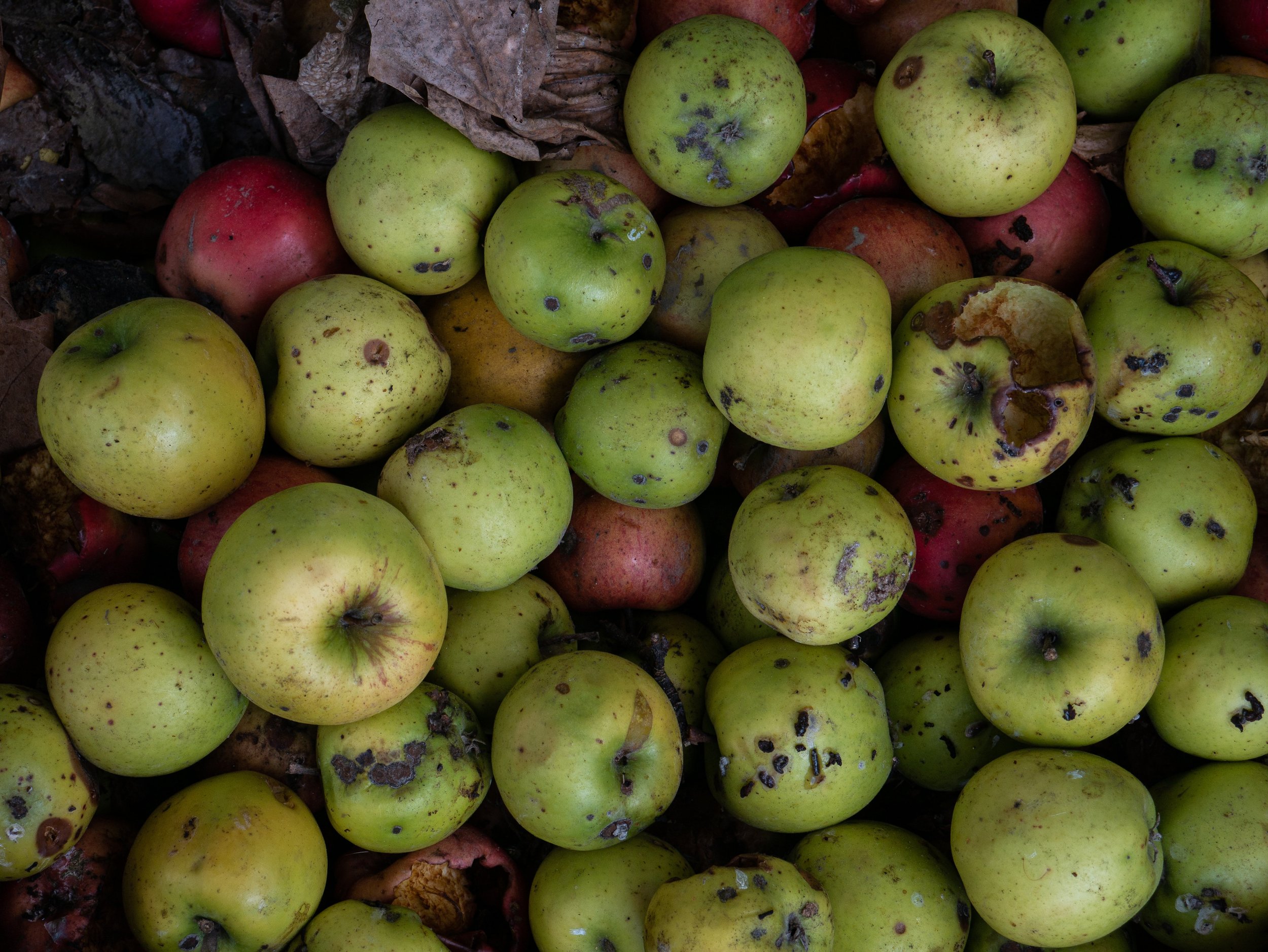‘A Meeting’ by Dearbhaile Houston
Rotting is a type of writing. She thought this while looking out at the windfall apples settling into the grass, disturbed only by the odd blackbird, or what might’ve been a thrush. He would know. The garden has not been looked after since he went and he knew the names of all the birds that visited and the ones that didn’t. How long had it been since then, since he left? Not that long. Only that he had been here at this exact moment last year and now he was not.
It was her house, which made him uneasy, she found. When it was just a place he assumed that she rented he was quite happy to make it his own. To rinse the sink, after washing the dishes, of the grit of old dinners. To carefully turn off each light before bed as she washed her face. And out of the bed early in the morning, to stand in front of the big window surveying the garden below, saying ‘see this’, ‘see that’. Once she told him she owned it – each brick, each tile in the upstairs bathroom as white as a milk tooth, every single blade of grass – he became like a caged animal. Taken to prowling and surveying from corners. She tried to make light of it – one of the perks of dead parents, she said. He didn’t laugh but brushed his hand along the mantel or tapped a wall and listened for an echo. You could knock that through, he said.
Rotting is a type of writing. She thought this while taking a plum from the fruit bowl. She had left it in a patch of sunlight so that the fruit would ripen. It was still supermarket-hard but she bit into it anyway. What do you mean by that, he would have said, had he been there. Or if this had been years and years ago, in one of his classes. Fixing her with a look that said you have my attention, but not for long. And she let herself imagine herself as she was back then. Turning up for class early – to have that time just to look at him – as he busied himself with handouts and PowerPoint. For him to look up at her, eventually, and ask her how she was. And she, swallowed up by shyness, saying fine in a voice like gossamer, staring intently at her notebook until everyone else arrived and it was safe to look up again. She surprised herself, even then, when she came out with things. Things either inane or enlightened – it was hard to tell. But it got his attention. Into the silence he would leave to simmer after posing a question she would venture a couple of sentences. Gone was the thin, floating voice, for however long it took to put forward her hypothesis on To the Lighthouse or Derrida or whatever he was teaching that particular term. She thought she impressed him and it made her feel purely, uncomplicatedly pleased with herself. Before this everything was tepid: someone lecturing her about their politics, knees pressed too close, making excuses to look deep into her eyes. This was a time in her life in which she owned a page-a-day diary that made her life seem very slim and small. The time that had elapsed did not quite seem to equate to the pages she had written her tasks in.
Rotting is a type of writing. Rotting is a type of righting. She thinks maybe she should put this down on paper, that there is something in this. She thinks of the apples sowing themselves into the ground, making something new. The ground is made of the dead. The dead. Parents layered into the earth. Out in St Fintan’s, the flat rolling view of Dublin Bay, the old graveyard with its worn stones behind them. It is hard to get out to them without a car, without the lift from her aunt once a year, to put new flowers at the grave, and then to a hotel for tepid soup, a hug and a cry. She thought a nuclear thought: not everyone is so lucky to have dead parents who leave them things. It makes you interesting, he said. The whole orphan thing. He was always so obtuse, so sure that hurt was the interesting part. But when she remembers this moment she can still feel him inside of her, can remember the way he cupped her face and stroked her hair and say God, I love you.
There was something in her family history that loved a brute, loved a man who needed managing. She is trying to make sense of her past. She would like to hold a meeting, convene her female ancestors to a table and ask them why they couldn’t love a gentle man. To put out chipped china plates (someone’s engagement present) at each chair and let dust motes settle in the eastern-seaboard sun. They would sit down and after a time, after each crumb was collected, they would tell her that damage can be gentle in its own way, a slow drip of the tap over months and years. To compensate for this, they bring gifts – half-price toiletry sets, a book of saints, a lock of baby’s hair (soft and sweet underneath yellowing Sellotape), a recipe for Oxford Lunch, cuttings of aloe vera plant, a rolled up Irish Writers poster with a coffee stain over Shaw’s shadowy face. But that’s not enough, she would say. They shrug. They leave. What they mean is, why should it be different just for you? Who said you deserved any different?
From issue #9: autumn/winter 2019
About the Author
Dearbhaile Houston’s work has previously been published in Banshee and The Dublin Review and she has read at Cúirt and the Cork Short Story Festival.

